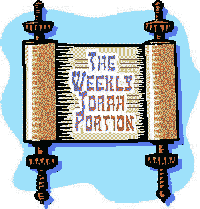Search our Archives:
» Home
» History
» Holidays
» Humor
» Places
» Thought
» Opinion & Society
» Writings
» Customs
» Misc.
|
Holiness in Perspective
By Michael Chessen
In general terms, we could view the book of Leviticus as the reflected
inversion of the book of Genesis. Genesis is wholly made up of historical
narrative which carries examples of moral and ethical behavior and precedes
the formal giving of the Torah by "laying groundwork" for a small number of
halachic commandments. Leviticus, for its part, almost wholly concerns
itself with prescribing commandments or conditions for serving God in
holiness, and offers but two historical narratives, one of which occurs in
this week's reading, Emor.
As in the earlier story of the death of Aaron's sons, Emor's narrative
also involves the unfortunate death of a young man and is shrouded in a
cloud of mystery which is dispelled only with the help of the midrash and
commentaries. Whereas the young man in question, identified only by his
lineage, did commit a capitol offense, the Torah is not at all wont to
report the administration of capital punishment. In fact, the Torah's
stipulations for capitol punishment are so restrictive that in the time of
the Second Temple, the administration of a single death sentence in a
period of seventy years was considered excessive.
The midrash informs us that the young "son of an Egyptian man" was
none other than the son of the Egyptian who Moses killed for torturing a
Hebrew slave. Before Moses did so, he looked around and saw that there was
"no man". Our simple understanding of this is that Moses was making sure
that "the coast was clear", but as the commentators point out, Moses
prophetically saw that no worthy individual was potentially due to issue
forth from this Egyptian. True enough, his son, unwittingly conceived by
the wife of the tortured slave, "goes out" in our Torah reading, looking to
cause strife. He subsequently blasphemes God by uttering the same ineffable
name which Moses had uttered in order to kill his father.
As difficult as this story may appear to be, it dramatically
illustrates both the specific principle that "the acts of fathers are a
sign for sons" as well as the general role that education plays in the
spiritual health and vitality of the Jewish people. In addition, we need to
view the short narratives of Leviticus within their proper context. Whereas
the few examples of commandments from Genesis come to provide us with
practical and tangible links to the holiness of the patriarchs and
matriarchs, the short narratives of Leviticus demonstrate the need to
approach the service of God with our holy ancestors' sense of balance and
perspective.
Wishing you all a Shabbat Shalom !

|
|
Please let us know if you see something unsavory on the Google Ads and we will have them removed. Email us with the offensive URL (www.something.com)
|





|
